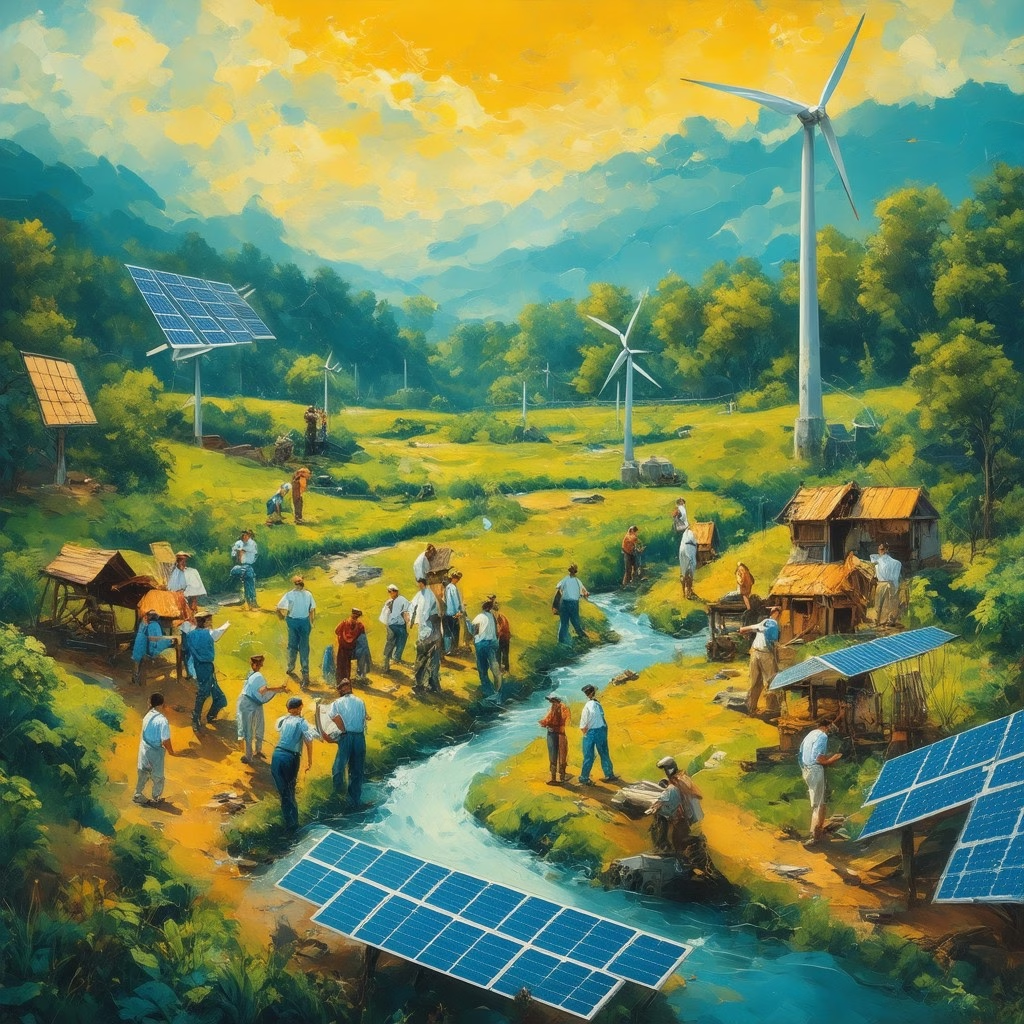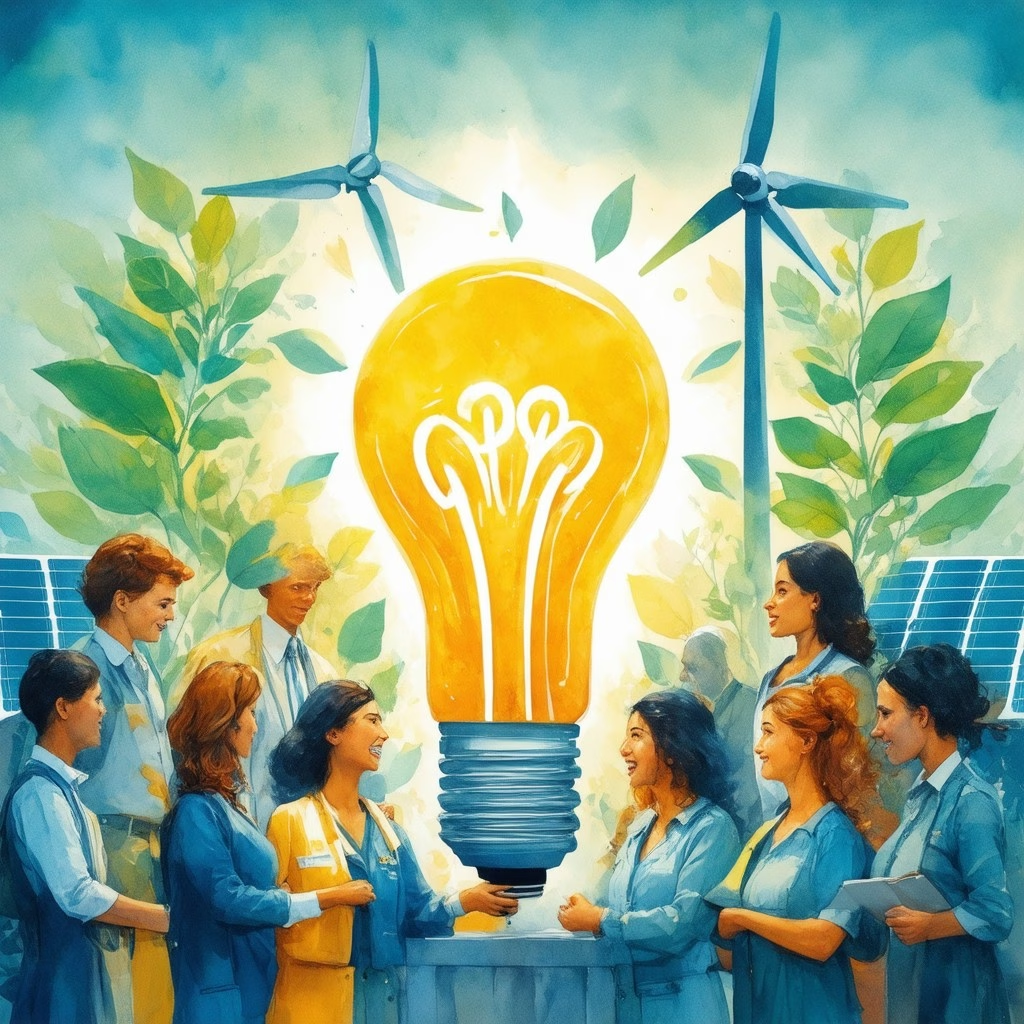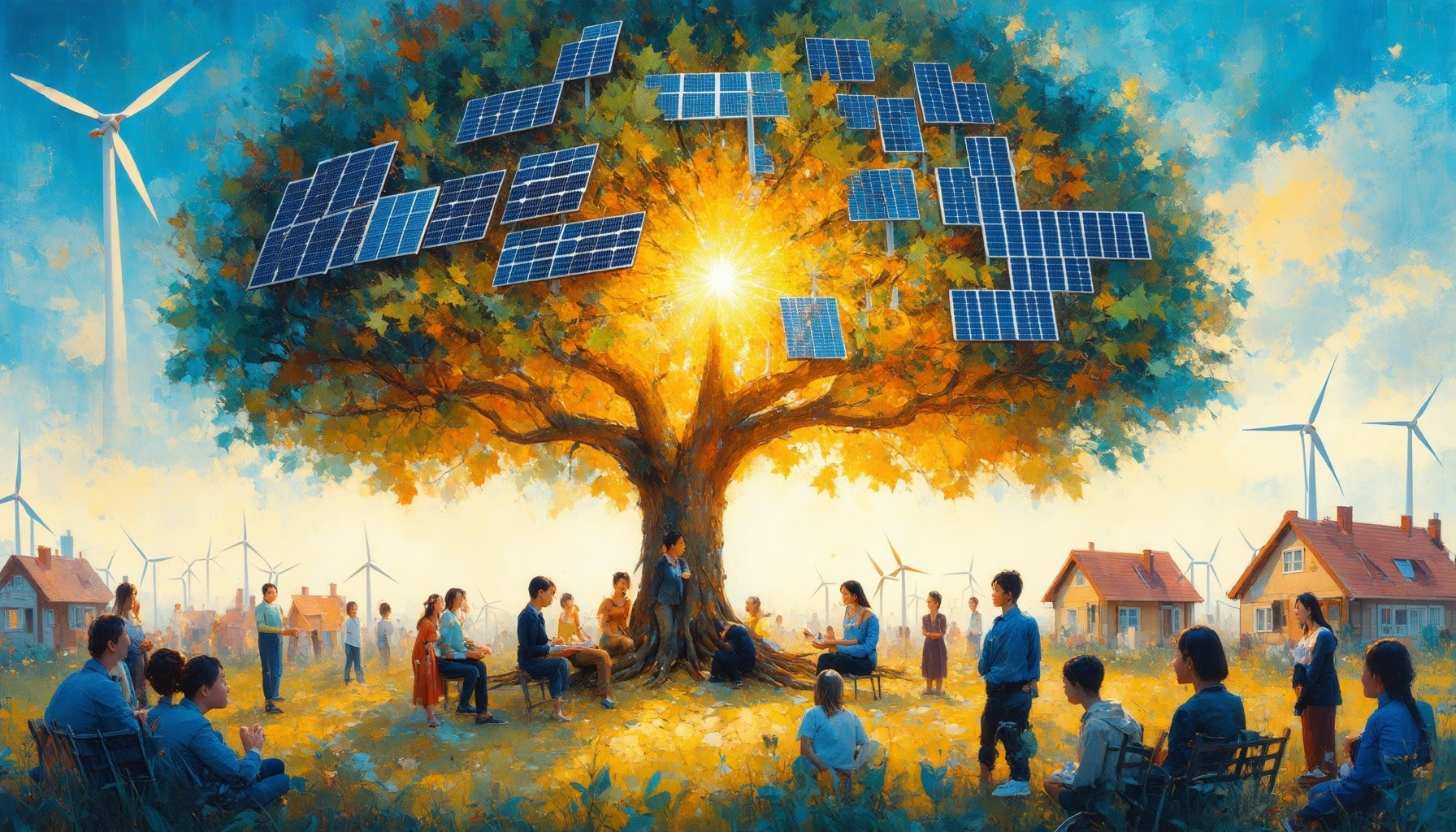Key Takeaways
- Explore various energy grant government programs that provide essential funding for nonprofits and homeowners, enabling significant energy cost reductions.
- Understand eligibility criteria for programs like the Rural Energy for America Program and High Energy Cost Grant Program to maximize available resources.
- Leverage federal energy grants to improve energy efficiency through upgrades like solar panels, HVAC systems, and insulation.
- Discover how specialized grants, such as solar energy grants for nonprofits, can enhance community sustainability and reduce operational costs.
- Access comprehensive resources to navigate the application process for government energy grants and stay updated on funding opportunities.
In today’s rapidly evolving energy landscape, understanding the various energy grant government programs available can be a game-changer for nonprofits and homeowners alike. This comprehensive guide delves into the intricacies of government funding opportunities, including the US Department of Energy grants and specific initiatives like the Rural Energy for America Program and the Federal Household Energy Upgrades Fund. We will explore eligibility criteria, the benefits of these grants, and how they can significantly reduce energy costs while promoting sustainability. Additionally, we will examine specialized funding options such as solar energy grants for nonprofits and HVAC grants for non-profits, highlighting their impact on community development and energy efficiency. By the end of this article, you will have a clear understanding of how to navigate the landscape of government energy grants, empowering your organization to take advantage of these vital resources.
What is the high energy cost grant program?
The High Energy Cost Grant Program, administered by the United States Department of Agriculture (USDA), is designed to assist power providers in reducing energy costs for families and individuals residing in areas where energy expenses are significantly elevated—specifically, those with per-household energy costs that are 275 percent or more of the national average. This program is a vital component of the broader effort to address energy affordability and sustainability across the nation.
Overview of Energy Grant Government Programs
Energy grant government programs play a crucial role in supporting communities facing high energy costs. These initiatives aim to provide financial assistance to eligible organizations and individuals, enabling them to invest in energy efficiency improvements, renewable energy projects, and infrastructure upgrades. The High Energy Cost Grant Program is one of several government energy grants designed to alleviate the financial burden of energy expenses on low-income households.
Key features of the program include:
- Targeted Assistance: The program focuses on communities that face extreme energy costs, often due to geographic isolation or limited access to affordable energy sources. This initiative aims to alleviate financial burdens on low-income households.
- Funding Mechanism: Grants are provided to eligible power providers, which can include rural electric cooperatives and public utilities. These funds can be utilized for various purposes, such as improving energy efficiency, investing in renewable energy sources, or upgrading infrastructure to reduce operational costs.
- Eligibility Criteria: To qualify for the program, applicants must demonstrate that their service area meets the high energy cost threshold. Additionally, the program prioritizes projects that will have a lasting impact on energy affordability and sustainability.
- Application Process: Interested parties can apply for funding through the USDA’s Rural Development offices. The application process typically requires detailed project proposals and evidence of community need.
For more detailed information, including application guidelines and eligibility requirements, visit the USDA’s official website or consult the USDA Rural Development resources. This program plays a crucial role in supporting energy equity and sustainability in high-cost areas, contributing to the overall goal of reducing energy poverty in the United States.
Importance of Energy Grants for Homeowners
Energy grants for homeowners are essential for promoting energy efficiency and reducing overall energy costs. These grants provide financial support that enables homeowners to make necessary upgrades, such as installing energy-efficient appliances, improving insulation, or transitioning to renewable energy sources like solar power. By taking advantage of energy government grants, homeowners can significantly lower their energy bills while contributing to a more sustainable environment.
Moreover, energy efficiency grants for nonprofits and other organizations can further amplify the impact of these initiatives. Programs like solar energy grants for nonprofits and federal energy grants help organizations implement energy-saving measures that benefit both their operations and the communities they serve. By investing in energy efficiency, homeowners and nonprofits alike can play a pivotal role in fostering a greener future.

Who is eligible for rural energy for America program?
The Rural Energy for America Program (REAP) is designed to support energy efficiency and renewable energy projects in rural areas. Understanding the eligibility criteria for government energy grants under this program is crucial for those looking to benefit from available funding.
Eligibility Criteria for Government Energy Grants
To qualify for the Rural Energy for America Program, applicants must meet specific criteria, which include:
- Agricultural Producers: Individuals or entities that derive at least 50% of their gross income from agricultural operations are eligible to apply. This includes farmers and ranchers who are looking to invest in energy-efficient equipment or renewable energy systems.
- Small Businesses: Small businesses located in eligible rural areas can also apply for funding. These businesses must meet the Small Business Administration’s size standards and operate in a rural community as defined by the USDA.
- Cooperatives and Nonprofits: Rural electric cooperatives and nonprofit organizations that support agricultural producers and small businesses may also qualify for REAP funding.
- Project Types: Eligible projects include renewable energy systems (such as solar, wind, and biomass) and energy efficiency improvements (like upgrading heating and cooling systems or installing energy-efficient lighting).
For more detailed information on eligibility criteria and application processes, you can refer to the USDA’s official website or consult resources like Gov Guider, which provide guidance on federal programs and funding opportunities.
Understanding the Rural Energy for America Program
The Rural Energy for America Program plays a vital role in promoting sustainable energy practices in rural communities. By offering grants and loan guarantees, the program encourages agricultural producers and small businesses to adopt renewable energy solutions and improve energy efficiency. This not only helps reduce energy costs but also contributes to environmental sustainability.
Through REAP, applicants can access funding for a variety of projects, including:
- Installation of solar panels and wind turbines
- Upgrading HVAC systems to more energy-efficient models
- Implementing energy-efficient lighting solutions
- Utilizing biomass for energy production
These initiatives not only enhance energy independence but also support the overall economic development of rural areas. For more insights on federal grants and their impact on nonprofits, you can explore federal grants for nonprofits and the various funding sources available.
Does the Government Pay for Renewable Energy?
Yes, the government does provide financial support for renewable energy through various subsidies and incentives. This commitment is evident in the substantial funding allocated to promote renewable energy projects, which plays a critical role in advancing sustainable energy solutions across the nation.
Government Grants for Renewable Energy Projects
The U.S. Department of Energy grants are pivotal in supporting renewable energy initiatives. These grants are designed to foster innovation and facilitate the development of renewable technologies. The types of government grants available include:
- Research Grants: Funding aimed at advancing research in renewable energy technologies, helping to improve efficiency and reduce costs.
- Project Grants: Financial assistance for specific renewable energy projects, such as solar, wind, and biomass installations.
- Loan Guarantees: Programs that provide guarantees for loans taken out by businesses and organizations to finance renewable energy projects.
These grants not only support the growth of renewable energy but also contribute to job creation and economic development in the clean energy sector. For more information on available grants, you can visit U.S. Department of Energy.
Overview of DOE Grants for Renewable Energy
The Department of Energy (DOE) plays a crucial role in funding renewable energy projects through various grant programs. These grants are essential for both large-scale and community-based renewable energy initiatives. Key aspects of DOE grants include:
- Eligibility: Grants are available to a wide range of applicants, including state and local governments, nonprofits, and private sector entities.
- Application Process: The application process typically involves submitting a detailed proposal outlining the project’s objectives, expected outcomes, and budget.
- Funding Opportunities: The DOE regularly announces funding opportunities for innovative projects that align with national energy goals.
By leveraging these grants, organizations can significantly reduce the financial burden associated with transitioning to renewable energy sources. For further insights on federal energy grants, you can explore Grants.gov.
What is the Federal Household Energy Upgrades Fund?
The Federal Household Energy Upgrades Fund, officially known as the CEFC Household Energy Upgrades Fund™, is a dedicated $1 billion initiative aimed at assisting homeowners in transitioning to more affordable and sustainable energy solutions. This fund is designed to facilitate the adoption of energy-efficient technologies and practices, ultimately reducing household energy costs and minimizing carbon emissions.
Federal Energy Grants for Home Improvements
The Household Energy Upgrades Fund provides essential federal energy grants that support homeowners in making significant improvements to their energy systems. Key features of the fund include:
- Financial Support: The fund offers financial assistance for the installation of energy-efficient systems, such as solar panels, heat pumps, and energy storage solutions. This support is crucial for making clean energy accessible to a broader audience.
- Environmental Impact: By promoting the use of cleaner energy sources, the fund plays a significant role in lowering the overall carbon footprint of households across the nation. This aligns with broader government goals of achieving net-zero emissions by 2050.
- Partnerships and Collaborations: The fund collaborates with various stakeholders, including local governments and energy providers, to ensure that homeowners receive comprehensive support and guidance throughout the upgrade process.
- Educational Resources: Homeowners can access a wealth of information and resources to help them understand the benefits of energy upgrades and how to implement them effectively. This includes guidance on selecting the right technologies and understanding potential savings.
- Long-term Benefits: Investing in energy upgrades not only leads to immediate cost savings on energy bills but also increases property value and enhances energy resilience, making homes more adaptable to future energy challenges.
Benefits of the Federal Household Energy Upgrades Fund
The benefits of the Federal Household Energy Upgrades Fund extend beyond immediate financial assistance. Homeowners can expect:
- Increased Energy Efficiency: Upgrading to energy-efficient systems reduces energy consumption, leading to lower utility bills and a more sustainable lifestyle.
- Enhanced Property Value: Homes equipped with modern energy-efficient technologies often see an increase in market value, making them more attractive to potential buyers.
- Support for Nonprofits: The fund also provides opportunities for energy efficiency grants for nonprofits, enabling organizations to improve their facilities and reduce operational costs.
- Community Impact: By participating in the program, homeowners contribute to a collective effort to reduce carbon emissions and promote sustainable energy practices within their communities.
For more detailed information on the CEFC Household Energy Upgrades Fund and its initiatives, you can visit the U.S. Department of Energy or consult government resources that outline energy efficiency programs.

What is a GPE grant?
A GPE grant, provided by the Global Partnership for Education (GPE), is a financial resource aimed at improving education systems in developing countries. These grants are designed to foster inclusive and results-oriented policy dialogues that address key challenges in the education sector. Key features of GPE grants include:
- Inclusive Policy Dialogue: GPE grants encourage collaboration among governments, civil society, and education stakeholders to create strategies that are responsive to local needs. This participatory approach ensures that diverse perspectives are considered in educational planning.
- Results-Focused Strategies: The GPE emphasizes measurable outcomes, aiming to improve learning outcomes and access to education. This focus on results helps ensure that funds are used effectively to achieve significant educational improvements.
- Leveraging Domestic Financing: GPE grants aim to enhance domestic financing for education by encouraging governments to allocate more resources to their education sectors. This approach helps build sustainable education systems that are less reliant on external funding over time.
- Aligned Support from Partners: The GPE works with various partners, including international organizations, NGOs, and private sector entities, to align support and resources. This collaborative effort maximizes the impact of funding and ensures that educational initiatives are comprehensive and well-coordinated.
- Capacity Building: GPE grants often include components aimed at strengthening the capacity of local education systems, ensuring that stakeholders are equipped to implement and sustain educational reforms effectively.
How GPE Grants Support Nonprofits and Communities
GPE grants play a crucial role in supporting nonprofits and communities by providing essential funding that enables educational initiatives to flourish. These grants help organizations implement programs that enhance educational access and quality, particularly in underserved areas. By focusing on community engagement and local needs, GPE grants empower nonprofits to develop tailored solutions that address specific educational challenges.
Moreover, GPE grants often facilitate partnerships between nonprofits and government entities, fostering collaboration that can lead to more sustainable educational outcomes. This synergy not only enhances the effectiveness of educational programs but also encourages a shared commitment to improving education systems. For more information on how GPE grants impact global education, visit the Global Partnership for Education.
Exploring Department of Energy Grants Awarded
The energy grant government programs administered by the U.S. Department of Energy (DOE) play a crucial role in funding various energy initiatives across the nation. These grants are designed to support projects that enhance energy efficiency, promote renewable energy sources, and reduce greenhouse gas emissions. Understanding how to search for these grants can significantly benefit individuals and organizations looking to secure funding for their energy-related projects.
How to Search for Department of Energy Grants
To effectively search for U.S. Department of Energy grants, you can utilize several resources:
- Grants.gov: This is the primary portal for finding federal grant opportunities, including those from the DOE. You can filter searches by agency, eligibility, and funding type.
- U.S. Department of Energy: The DOE’s official website provides information on current funding opportunities, application guidelines, and program details.
- National Renewable Energy Laboratory: This site offers insights into renewable energy grants and research initiatives supported by the DOE.
- Environmental Protection Agency: While primarily focused on environmental issues, the EPA also provides information on grants related to energy efficiency and sustainability.
By leveraging these resources, applicants can stay informed about available funding and enhance their chances of securing a government energy grant.
Recent DOE Funding Announcements and Opportunities
Staying updated on recent funding announcements from the DOE is essential for potential applicants. The DOE frequently releases information about new grant opportunities, including specific programs aimed at supporting renewable energy projects and energy efficiency improvements. For instance, recent announcements have highlighted funding for:
- Solar energy grants for nonprofits: These grants aim to support nonprofit organizations in implementing solar power solutions, reducing operational costs, and promoting sustainability.
- HVAC grants for non-profits: Designed to help nonprofits upgrade their heating, ventilation, and air conditioning systems, these grants enhance energy efficiency and reduce energy expenditures.
- Energy efficiency grants for churches: These grants assist religious organizations in making energy-efficient upgrades to their facilities, contributing to lower utility bills and a reduced carbon footprint.
For the latest updates on funding opportunities, regularly check the DOE’s announcements and subscribe to their newsletters. This proactive approach can help you identify and apply for relevant energy government grants that align with your projects.
Energy Efficiency Grants for Nonprofits
Energy efficiency grants for nonprofits are essential funding opportunities designed to help organizations reduce energy consumption and lower operational costs. These grants can cover various projects, including HVAC upgrades, insulation improvements, and renewable energy installations. By accessing these funds, nonprofits can enhance their sustainability efforts while reallocating savings towards their core missions.
HVAC Grants for Non-Profits and Their Benefits
HVAC grants for non-profits provide financial assistance specifically for heating, ventilation, and air conditioning system upgrades. These grants are crucial for organizations looking to improve indoor air quality and energy efficiency. Benefits of HVAC grants include:
- Cost Savings: Upgrading to energy-efficient HVAC systems can significantly reduce energy bills, allowing nonprofits to allocate funds to their programs.
- Improved Comfort: Enhanced HVAC systems create a more comfortable environment for staff and clients, which can improve productivity and satisfaction.
- Environmental Impact: Reducing energy consumption contributes to lower greenhouse gas emissions, aligning with many nonprofits’ missions to promote sustainability.
Organizations can explore HVAC grants through various sources, including federal energy grants and local government programs. For more information on available grants, visit the U.S. Department of Energy.
Solar Grants for Nonprofit Organizations and Their Impact
Solar grants for nonprofit organizations are designed to support the installation of solar energy systems, providing a sustainable energy source that can drastically reduce electricity costs. The impact of solar grants includes:
- Financial Relief: By harnessing solar power, nonprofits can significantly lower their utility expenses, freeing up resources for community services.
- Energy Independence: Solar energy allows nonprofits to become less reliant on traditional energy sources, enhancing their resilience against fluctuating energy prices.
- Community Leadership: Nonprofits that adopt solar energy can serve as role models in their communities, promoting renewable energy and environmental stewardship.
Nonprofits interested in solar grants can find opportunities through programs like the National Renewable Energy Laboratory and various state government initiatives. These grants not only support financial sustainability but also contribute to a greener future.




